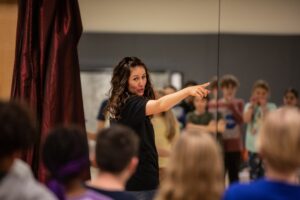
As an actor, I love auditions. As a director and choreographer, I love them even more. But there are some traditional norms in theatre auditions that aren’t my favorite. Not that film doesn’t have something to learn from theatre–more on that later–but there are some film procedures and conventions that I wish theatre would adopt.
Video Submissions at Initial Auditions
Video submissions, oh how I love thee, let me count the ways.
1- Actors can send their best take.
2- Actors save gas money and time by not commuting to a live audition on a specific day/time.
3- Casting teams can review the audition if there are any questions and not just rely on notes taken.
4- Casting teams can view auditions by character or any other sorting metric without needing to arrange the schedules of un-contracted talent.
5- Casting teams can discuss responses to the auditions after each actor without feeling the time pressure of the next audition appointment.

When I’m seated at the casting table, I do a lot of smiling encouragingly at the actors. I enjoy doing it. It’s genuine. But it also makes my face hurt doing that hour after hour. I like watching an audition without worrying about what I might be inadvertently communicating back. My face can rest and no one will interpret that as part of my reaction or their ability. I can also go to the bathroom or stand up and stretch when I need to. My favorite of these silly little side benefits is that during video auditions, I can snack and wear sweatpants while I’m watching and no one thinks I’m unprofessional. These silly, little side benefits are the icing. The cake is that, ultimately, I think video submissions are roundly more respectful of the actor’s craft, time, vulnerability, and investment. At callbacks, I like to be live in the same room.
Auditioning with the Actual Material
Yes, there is still the occasional film audition where you prepare a monologue or pantomime of your own choosing, but these are few and far between. I LOVE that film lets me “show from the first go.” In theatre, too often, you don’t get to work with the material until callbacks. The way I, as a director, can guarantee that I’ve considered you for the role is if you show me yourself in the role, not something adjacent–not 16 bars in the style of the show. I can’t invite everyone to callbacks. But if the material is accessible and the piece has been around a while, it’s so easy to let actors show you the role they want using the material of that character in the initial audition. And if the show hasn’t been around a while…well, it’s still pretty easy to provide audition material at initial auditions the way you would at callbacks. As an actor, too, I find it satisfying to portray the role with the material written for it. It saves me trying to game the thing by guessing which Broadway song is most like, but not too like, the one I really want to sing. It eliminates tossing a great option under the worry, “What if a bunch of other people are singing this?”

What Film Should Learn from Theatre
Courtesy. Film really leaves the uncast actor hanging. In theatre, you can hear you didn’t get cast a number of ways, the two most common being that the cast list is posted or you receive a “thank you but not this time” email. Film doesn’t do that as much. It’s such a simple courtesy to the actor but I think it’s important. If you really want to know, I vastly prefer the email to the publicly-posted cast list. An actor should find out from the production, not from a friend who has more time to hang out on social media.
Content. As an actor, it’s far easier for me to get information about the production and the script when auditioning for theatre. Even if it’s a new work, getting a perusal copy is generally quick and convenient. Auditioning for film always feels like a gamble. Do I really know the extent of what I’d be getting into if I go to this audition? No one wants to audition for something only to turn around and say, “I’m sorry, I didn’t realize…and I’d rather not.”

Doin’ What Comes Nat’rally
There are exceptions to the sweeping generalizations made above. It does feel like a period of change for theatres in my area where many are questioning if the traditional audition process is the most useful. Some venues and companies are innovating and experimenting. I enjoy seeing it and learning from it. What’s your input? What audition processes have you found beneficial from either side of the table?
The opinions given above are mine and based on my experience, which is going to be narrow in the way personal experience inevitably is. Feel free to disagree. If you’d like to thoughtfully disagree in the comments, I love having new things to think about.
